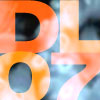(JB) Lets stick to Thursday's surveillance issue with the aptly named Surveillance Camera Players and their piece “1984”. The SCP hail originally from New York, although – according to their website – similar groups have been organized in other cities. We have seen a lot of anti-surveillance-art post 9-11, but the SCP have been around since 1996, and draw their inspiration from classical media and performance art (think Chris Burden, Bruce Nauman, Vaile Export etc.) rather than the technological or critical-studies-infused takes on surveillance we are used to by now through the Transmediale or Ars Electronica. Klaus W. Eisenlohr had placed their video within a screening named “Psychogeography”, after a term coined by the Lettrist & Situationist movement in the fifties, and I would say that the SCP fits very well into the radical absurdist style of their predecessors.
The Surveillance Camera Players both used and protested again CCTV recording with playacts specifically designed for surveillance cameras.
Sari Carel photographs abandoned contemporary houses in Israel. She thus reflects on the left behind dreams, promises and plans connected with single-family houses.
Thomas Fuerhapter and Ken Paul Rosenthal give a voice to psychological effects of urban experiences, not avoiding the irony of the possibility to overrate such experience.
Elke Marhöfer deconstructs the interaction of political talks by young international artists, and confronts those with her own media interaction with young black youths in the streets of New York. She is thus reflecting the mixture of failure and need of such practise.
Also, the piece we've seen is quite paradigmatic for classical Media Art with its usage of recording & transmission on multiple levels. Basically, the SCP stage drastically abridged versions of popular plays or texts (Jarry's Ubu Roi, Wilhelm Reich's The Mass Psychology of Fascism, Orwell's Animal Farm & 1984 – well, you might see a common theme emerging ...) which are performed using big cardboard signs with text passages in front of “public” surveillance cameras. The performance “1984” was staged in a subway station in NYC, and recorded from the monitor attached to the surveillance camera; thus, the whole thing retains its performative aspect as we don't see a recording of a theatrical performance itself, but simply the recording of a surveillance screen attached to a camera, currently – and independently of the artists actions – recording a theatrical performance.
Even without the video-of-a-video-of-a-performance cleverness, I really like the “parasitic” concept of SCP's work. Some of you might have seen a work with a similar concept - “Stealing Beauty” by Israeli Artist Guy Ben-Ner in Berlin's DAAD Gallery earlier this Winter; Guy Ben-Ner basically staged a short film with his family using the displays in an IKEA store as a setting (obviously, he was kicked out from several IKEAs before he could finally complete the movie).
Kim Collmer, curator of Monumental, withSophia New and friend
The parasitic abuse of “public space” (please note the quotation marks for inherent suspicion and/or paranoia) and its shady equipment is taken to another level in the charmingly nerdy “Palpatine am Platz der Vereinten Nationen” by Sven Kalden (2007), shown during the screening of Films selected by Kim Collmer. To a MIDI rendition of appropriate Star Wars tunes, the black-robed demagogue remodels the rather ungainly fountain on the “Platz der Vereinten Nationen” into a bizarre installation, re-routing the water flow to something we might interpret as a symbolic light saber replica from the Star Wars canon. Finally, the now water-soaked “Palpatine” takes his very own place as the heroic saber wielder in a monument to, well, himself.
The comic capers of the Star Wars antagonist reinforce an inherent absurdity of their setting; the “Place of the United Nations”, formerly the site of a Lenin monument (and accordingly named Leninplatz until 1992), is indeed a involuntarily ironic comment in itself, on both the failed representative agenda of the GDR and the dubious naming choice of a veritable non-space by its successor (which might lead to some rather serious questions about Germany's commitment to the idea of a international community).
Check back soon for more on Friday's screenings -
Best, JB



 Spree Getraenke
Spree Getraenke











0 Comments:
Post a Comment